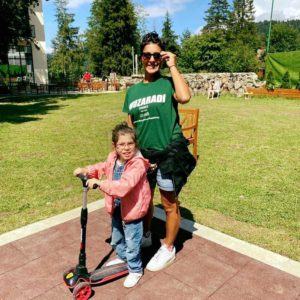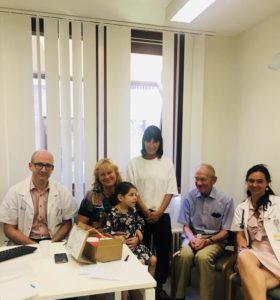A disease is considered rare when it affects fewer than 1:2,000 people. There are about 7,000 known rare diseases, and 80% of these are genetic in origin. Despite the fact that individually these diseases are rare, collectively they are common, with 3.5%-5.9% of the world’s population having some type of a rare disease, equaling a total of over 300 million people worldwide. Of note, about 50% of all rare diseases manifest in childhood and sadly 30% of people born with rare diseases will not live to see their 5th birthday. It’s a well-known fact that people born with rare diseases on average require 3 to 6 years before they receive the final diagnosis, spending an enormous amount of time, energy and money in search of the cause of the disease while being in the ‘diagnostic odyssey’. Thus, raising awareness about these conditions can facilitate early diagnosis, improved treatment options, avoid unnecessary investigations and achieve accurate genetic counseling for recurring risks.
CDG comprises a group of rare genetic metabolic disorders due to defects in a complex chemical process known as glycosylation. There are different types of CDGs, depending on the defective gene and the corresponding deficient enzyme encoded by that gene. The symptoms of the disease may be quite diverse, and include delayed development in children, brain abnormality, seizures, blood clotting defects, heart problems, eye problems and distinctive facial features. Because of the rarity of the condition, many doctors fail to recognize the disease, and even when diagnosed, the local medical expertise remains limited. Thus, international patient-centered CDG organizations help families, researchers and doctors to connect with each other, share their experience and support the patients and families, as well as the treating physicians.
Recently, the organization ‘CDG Georgia’ was created. The aim of the organization is to support CDG patients and their families, provide up-to-date information about new developments in CDG, increase awareness of this rare condition among doctors and the general population, and facilitate the involvement of CDG patients in global registries and new therapeutics.
To learn more about CDG Georgia’s goals and ideas, GEORGIA TODAY spoke with its founder, Tata Tsintsadze.
How did you come up with the idea to create CDG Georgia?
10 years ago, my younger daughter Natalia was born. We noticed she had multiple health issues and her development was delayed. We did not know what was the cause of her problems. We took her to many different doctors and did multiple investigations and finally she was diagnosed with CDG 1a. At that time, in 2011, only 200 children worldwide had been diagnosed with CDG, and Natalia was the only one in Georgia. It took me several years to accept the diagnosis and to learn how to live with it.
Now, I am in touch with doctors in Belgium working on this disease.
Over the years, Natalia would have both good times and bad related to her health, but she inspired me not to give up, and motivated me to set up a goal to raise awareness about CDG in our country. It was during the pandemic that I was finally able to turn my idea into reality by creating a shared space aiming to spread information about rare diseases, and help people connect by exchanging knowledge and experiences. That space is CDG Georgia.

What is the main goal of CDG Georgia?
CDG Georgia aims to support patients and families with CDG, increase awareness about this condition, and connect doctors, scientists and families. I believe that only with the joint efforts of parents and doctors will it be possible to provide effective information and medical support to patients and families with rare diseases. Parents’ joint effort is the strongest force!
What about the CDG community in Georgia?
To my knowledge, currently there are 7 diagnosed CDG patients in Georgia. We are constantly in touch with each other, like a big family. We share our children’s everyday challenges and achievements, support each other emotionally and psychologically, and provide each other with whatever new information we hear about our conditions. Whenever there is a newly diagnosed family, we all support the newcomers and make them understand they are not alone. Being a part of the CDG families’ community brings amazing feeling of security.
What about the awareness of CDG in Georgia?
As we mentioned above, CDG is a rare disease, and the awareness of rare diseases is still low among general practice doctors. Because of the diverse clinical presentations, it is not always easy to recognize the disease, neither for parents nor for medical professionals, especially at a very early age. Fortunately, we found doctors who are very well aware of this diagnosis in Georgia, who provide an adequate monitoring and surveillance plan for these patients, and I am happy to say that the number of such doctors is increasing.

The first CDG case was discovered by Professor Jaak Jaeken MD in 1980
Eva Morava-Kozicz, M.D., Ph.D.
Peter Witters, prof. Dr. Paediatric hepatologist
What are your plans for the future?
One of the most important future events is the upcoming 5th World Conference on CDG, which will be held on 13-16 May in Portugal in a hybrid format. This biannual event is held for families, patient groups, researchers, medical doctors, pharmaceutical and rare disease experts. Many Georgian CDG families will attend the conference to hear about the latest developments in this field. We are extremely proud and happy to say that for the first time in history, among 125 panelists from 25 different countries, Georgian doctors are invited as speakers on this huge event to share their own experience and ideas, learn about recent developments, and interact with families and professionals.
Above all, our main future plan is to support CDG families as well as others with various different rare diseases. By raising awareness of rare diseases, we aim to make rare disease patients an equal part of our society, without any discrimination. Patients with rare diseases may have limited abilities, but at the same time the rarity of these conditions makes them so special and worthy of respect!














